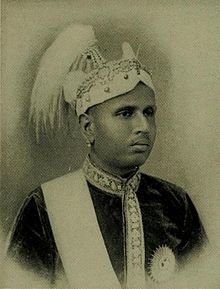Sree Moolam Thirunal Ramavarma
| Sir Rama Varma VI | |||||
|---|---|---|---|---|---|
| Maharaja of Travancore | |||||
 |
|||||
| Reign | 4 August 1885 – 7 March 1924 | ||||
| Predecessor | Visakham Thirunal | ||||
| Successor | Sethu Lakshmi Bayi (Regent) | ||||
| Born | 25 September 1857 | ||||
| Died | 7 March 1924 (aged 66) | ||||
| Wives |
|
||||
|
|||||
| House | Venad Swaroopam | ||||
| Dynasty | Kulasekhara | ||||
| Father | Changanassery Raja Raja Varma | ||||
| Mother | Rani Lakshmi Bayi | ||||
| Religion | Hinduism | ||||
| Full name | |
|---|---|
| HH The Maharajah of Travancore Sree Padmanabhadasa Vanchipala Sir Rama Varma VI |
Mulam Thirunal Rama Varma was the ruling Maharajah of the Indian state of Travancore between 1885 and 1924, succeeding his uncle Maharajah Visakham Thirunal (1880–1885).
Mulam Thirunal Rama Varma was born on 25 September 1857 to Prince Raja Raja Varma of the Changanassery Royal Family and Maharani Lakshmi Bayi of Travancore, niece of Maharajah Swathi Thirunal. His mother died when he was only a few days old. The Maharajah had an elder brother, Hastham Thirunal. After the usual vernacular Malayalam studies, the two princes were placed under the tutorship of Annaji Rao B.A. and later under Raghunath Rao B.A. at a country house built specially for the purpose. Hastham Thirunal soon had to stop his studies owing to ill health and so Rama Varma remained the only pupil under the tutor. He was initially taught subjects such as history, geography, arithmetic and grammar. His great-grandmother was the Maharani Gowri Lakshmi Bayi of Travancore.
The Travancore Legislative Council was established in 1888, three years after Moolam Thirunal became Maharajah. This was the first Legislative Council for a native state in the history of India. It was later succeeded by the Sree Moolam Popular Assembly, the first legislature in Indian history to have elected members.
In 1886 a proclamation was issued relieving people of the requirement to pay of penalties on documents executed on unstamped government cadjan leaves (paper was not yet in common use in Travancore). In 1887, the penalty for non payment of stamp duty was reduced as it was found to be a huge burden. The same year, another royal proclamation was passed relinquishing the right of the government in property left by a person under the Marumakkathayam matrilineal system of inheritance when a person died without heirs. Likewise under the then system, when a tenant of a Jenmi or landlord died heirless, instead of the land passing in entirety to the landlord, it passed with sovereign right to the government who auctioned it later. This was abolished.
...
Wikipedia
